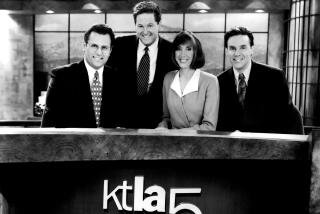George Putnam, longtime L.A. newsman, dies at 94
- Share via
George Putnam, the pioneer television news anchorman and conservative commentator whose distinctive stentorian voice was familiar to millions of Southern Californians during his heyday in the 1950s and ‘60s, died today. He was 94.
Putnam, who had been suffering from a kidney ailment since December, died at Chino Valley Medical Center, said Chuck Wilder, Putnam’s co-host, producer and announcer.
Perhaps best remembered for his “One Reporter’s Opinion” TV newscast segments, Putnam began his broadcast career on a Minneapolis radio station in 1934. More than 70 years later, he was still at the microphone with his weekday, noon to 2 p.m. “Talk Back with George Putnam” syndicated program.
Putnam did his last regular broadcast on May 8 but returned on July 14 for a one-hour broadcast marking his 94th birthday, during which he fielded phone calls from well-wishers, including actress Doris Day.
CRN Digital Talk Radio will present a special tribute on CRN-1 at 12 p.m. today.
When Putnam was working for NBC in New York City in the early 1940s, influential newspaper columnist Walter Winchell declared that “George Putnam’s voice is the greatest in radio.”
But it was on television in Los Angeles a decade later on KTTV Channel 11 that the tall, wavy-haired broadcaster with the rich baritone voice made his biggest mark.
“George was the great communicator, before that title was ever applied to anyone,” veteran KTLA-TV reporter Stan Chambers wrote in his 1994 book “News at Ten: Fifty Years with Stan Chambers.”
“His vibrant enthusiasm, commanding appearance, and booming voice blended to make him a major force in television news,” wrote Chambers. “He not only delivered the news, he cared about it and got involved in his stories.”
The recipient of three local competitive Emmy Awards, six California Associated Press TV and Radio Assn. awards and more than 300 other honors and citations, Putnam at one time was reportedly the highest-rated and highest-paid TV news anchor in Los Angeles.
On KTTV Channel 11 in the 1950s and early 1960s, Putnam would conclude his 15-minute 6:45 p.m. news broadcast with his signature theatrical flair.
“And that’s the up-to-the-minute news, up to the minute, that’s all the news,” he would say, then add: “Back at 10, see you then!”
Putnam was criticized by some for stepping beyond the bounds between his role as a reporter and that of a commentator.
Indeed, when Los Angeles County Dist. Atty. William B. McKesson, who had been appointed after Dist. Atty. Ernest Roll’s death in 1956, sought election, Putnam proclaimed during his news broadcast: “Many of you have asked where I stand in the race for Los Angeles district attorney. I stand for Los Angeles Dist. Atty. William B. McKesson.” He then listed his reasons for endorsing the candidate.
Former President Richard M. Nixon, speaking on videotape during a 1984 roast of Putnam given by KTTV to celebrate his 50th anniversary in broadcasting, said of the outspoken newscaster: “Some people didn’t like what he said; some people liked what he said. But everybody listened to George Putnam. That is why he has been one of the most influential commentators of our times.”
Despite his reputation as a staunch conservative, Putnam said in a 1994 interview with The Times that he “never thought of myself as a conservative.”
“I detest labels,” he said. “I’ve been called many things in my career: right-wing extremist, super-patriot, goose-stepping nationalist, jingoistic SOB. And those are some of the nice things!
“But those people have never bothered to determine my background: Farmer-Labor Party, Socialist Party, lifelong member of the NAACP, member of the Urban League. I went through the Depression, and my father was reduced to selling peanuts door-to-door. Then, because of that, I fell in love with Franklin D. Roosevelt. I’ve been a lifelong Democrat. I’m a conservative Democrat.”
Born in Breckenridge, Minn., on July 14, 1914, Putnam landed his first broadcasting job at age 20, on WDGY, a 1,000-watt radio station in Minneapolis. He began by answering the phone and spinning records.
By the late 1930s, he had moved to New York City, where his professional stock rose considerably after columnist Winchell praised the sound of his voice on radio.
“Winchell made my career,” Putnam told The Times. “I went from $190 a month at NBC to better than $200,000 a year.”
During World War II, Putnam was drafted into the Army and then commissioned in the Marine Corps, for which he was involved with the Armed Forces Radio Service.
Around 1948, he was hired by the DuMont television network, for which he wrote and delivered six commentaries a week on a news show broadcast from New York. He added to his professional prestige by sharing the role as the voice of Fox Movietone News with legendary broadcaster Lowell Thomas.
In late 1951, he was hired at KTTV, the independent station then owned by Times-Mirror Co., which also owned the Los Angeles Times, which is now owned by Tribune.
TV news at the time, Putnam said in a 1983 Times interview, “was pretty damn elementary,” with 15 people at most working on the newscasts, compared with 80 or 90 three decades later. And covering a story in the field was a challenge unto itself, he said. “In those days, it was like moving a house to get the equipment set up.”
TV news crews shot with 16-millimeter movie cameras at the time and, Putnam recalled, and all the stations would rush to the same processing lab in the afternoon to get the film developed in time for the evening newscasts.
“If you got there late, you’d have to stand in line,” Putnam said. “I remember times when someone would run into the studio and yell, ‘Hey, the film will be here in 10 minutes. Ad-lib some stuff!’ You had to be ready for almost anything.”
Putnam was said to have been one of the inspirations for Ted Baxter, Ted Knight’s blustery newscaster character on “The Mary Tyler Moore Show.”
In the mid-1960s, Putnam moved to KTLA Channel 5, although he returned to KTTV after about two years and then moved back to KTLA in the early 1970s. Brief stints at KHJ Channel 9 and KCOP Channel 13 followed, including co-hosting “Both Sides Now,” a short-lived talk show with comedian Mort Sahl.
By the early 1980s, most of his professional life was devoted to his daily current-events radio talk show, which he launched on KIEV-AM (870) in 1976 and where he remained a fixture for nearly three decades.
Since 2004, CRN Digital Talk Radio has syndicated Putnam’s “Talk Back” program to a national audience on cable TV, radio stations and the Internet.
Putnam broadcast the show from a studio at his ranch in Chino, where he and his companion of 52 years, Sallilee Conlon, bred thoroughbred horses and provided a home for abandoned animals.
For more than 45 years, Putnam rode a silver-saddled palomino in the Tournament of Roses Parade. He also made cameo appearances as a newscaster in a number of movies over the years, including “I Want to Live!,” “Helter Skelter” and “Independence Day.”
In addition to Conlon, Putnam is survived by his estranged wife, Virginia; two daughters, Jan and Jill; his brother, Robert; and three grandchildren.
A public memorial service is pending.
dennis.mclellan@latimes.com
More to Read
The complete guide to home viewing
Get Screen Gab for everything about the TV shows and streaming movies everyone’s talking about.
You may occasionally receive promotional content from the Los Angeles Times.






